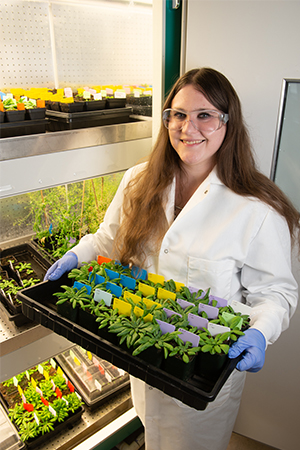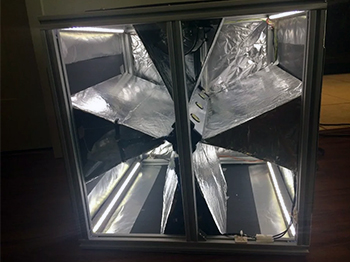SIUE Grad Student Named Finalist in Space Competition
 “Understanding how plants adapt in an extraterrestrial environment is critical for providing agronomically significant targets for genetic engineering and helping to grow plants on the International Space Station (ISS) for future long-distance space exploration.”
“Understanding how plants adapt in an extraterrestrial environment is critical for providing agronomically significant targets for genetic engineering and helping to grow plants on the International Space Station (ISS) for future long-distance space exploration.”
Spoken with true passion and the promise of a pioneering career as a molecular biologist, Southern Illinois University Edwardsville biological sciences graduate student Sophie Bandurski is making a name for herself as a forward-thinking inventor. Bandurski was a finalist in the Growing Beyond Earth Maker Contest, earning acclaim for her team’s creation of an Aeroponic Microgravity Planting System.
“We designed an aeroponic growth chamber that considers how plants respond on a physiological and molecular level to microgravity, compared to Earth, to successfully grow plentiful, robust crops aboard the ISS,” Bandurski explained.
According to Bandurski, and her contest partner, Daniel Sarafconn, a mechanical design and robotics engineer, their system prototypes the necessary modifications that future growth chambers could include to successfully cultivate lettuce and other produce in space.
“When plants are in space there are myriad stresses that they are exposed to that affect them on a molecular, cellular and physiological level,” she said. “Lack of air convection, for example, can lead to oxidative and hypoxic stress that negatively affects growth and development. This is important, because other space agriculture systems like Veggie and Advanced Plant Habitat do not adequately account for such stresses. This is what our machine was built to improve upon. We chose aeroponics, because essentially growing them in air helps aerate roots unlike other hydroponic, soil or petri dish systems that have been tried in space.”
 “While we did not win, we were honored to have placed in this competition,” Bandurski added. “My partner and I worked hard to combine our biological and technical expertise to design the novel, efficient machine. We will continue to optimize our design.”
“While we did not win, we were honored to have placed in this competition,” Bandurski added. “My partner and I worked hard to combine our biological and technical expertise to design the novel, efficient machine. We will continue to optimize our design.”
Bandurski previously completed a degree in genetics and molecular biology at Smith College and worked for Monsanto. Now as a master’s candidate at SIUE, she has the unique opportunity to work as a research assistant in the lab of Darron Luesse, PhD, associate professor in the Department of Biological Sciences, a highly-regarded teacher-scholar who has partnered with NASA on research endeavors.
“Sophie has embraced space science, and for me, it is exciting to see young scientists become enthusiastic about the things in which I’m interested,” Luesse said. “Space exploration is exciting, but to make it happen we need better technology. Long-term colonies on Mars or long-distance travel will require technology we are just developing. While plants are often ignored, they are a critical part of space exploration, because they make oxygen and food. Learning to successfully cultivate plants in space is a major part of planning for long-term exploration.”
“Being a graduate student teaches you to become independent and ask more questions, so that you can come up with your own ideas and pioneer your own research,” said Bandurski, who is researching how plants adapt in an extraterrestrial environment as part of her master’s thesis. “As my mentor, Dr. Luesse asks difficult questions so that I can troubleshoot. I believe his influence helped me not only with building the Aeroponic Microgravity Planting System, but also is shaping me as a scientist so I can be successful in any career I choose.”
Bandurski will present on her research being conducted in the Luesse lab in November 2020 at the American Society for Gravitational and Space Research. While there, she plans to use her Aeroponic Microgravity Planting System design as a point of conversation with experts in the field.
Photos: SIUE graduate student Sophie Bandurski was a finalist in the Growing Beyond Earth Maker Contest.
Bandurski and her partner created an Aeroponic Microgravity Planting System.










